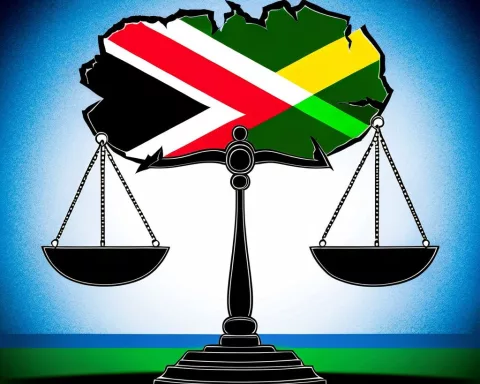South African taxpayers were outraged after it was revealed that Police Minister Bheki Cele’s executive assistant’s trip to the Rugby World Cup in France, costing over half a million Rand, was funded by public funds. The revelation sparked political outrage and a public uproar, prompting the opposition party, the Democratic Alliance, to launch a PAIA application to uncover more information about the trip. The controversy has highlighted the need for transparency, accountability, and ethical behavior among public officials in South Africa.
What sparked public outrage in South Africa after the Rugby World Cup?
Police Minister Bheki Cele’s executive assistant’s trip to the Rugby World Cup, costing over half a million Rand and funded by South African taxpayers, sparked public uproar and political figures’ dismay. The DA launched a PAIA application to uncover more information about the trip, igniting speculation about the controversial executive assistant’s identity and the ethical behavior of public officials.
The Unearthing of High-end Expenditure
News across South Africa bristled with contentious debates after Police Minister Bheki Cele unveiled the all-inclusive trip of his executive assistant to the Rugby World Cup, costing more than half a million Rand. The disclosure was in response to an inquiry in parliament led by the opposition party – the Democratic Alliance (DA). This revelation sparked a public uproar, with political figures expressing their dismay.
Underneath the warm October sun in France, South Africa and New Zealand’s formidable rugby teams took the limelight, their every action under the watchful eyes of global sports fans. Among the audience was a distinguished group of South African cabinet ministers, with Cele among them. Yet, despite the exhilarating game, it was the revelation of the excessive amount spent on Cele’s executive assistant’s travel and accommodation that overshadowed the event.
DA’s Reaction to Misused Funds
The DA released a statement indicating that while an anonymous company privately funded Cele’s trip, South African taxpayers bore the weighty cost of his executive assistant’s trip. The audacious spending didn’t stop there. Reports suggested that South African citizens also covered Cele’s travel insurance and allowances.
The DA expressed its shock over such lavish expenditure during a time of severe budgetary constraints for the South African Police Service (SAPS), which also faced detective shortages and dilapidated police stations. The expenditure, the DA argued, was difficult to defend considering its harmful effect on essential public services.
In an attempt to seek transparency and answers, the DA launched a Promotion of Access to Information Act (PAIA) application. Their intent was to uncover more information about the trip, such as whether the executive assistant traveled on business or first-class flights and stayed in 5-star hotels, all funded by taxpayers’ money.
The Mystery Executive and Transparency
Meanwhile, the identity of the controversial executive assistant remained undisclosed, igniting speculation and anticipation throughout South Africa. Social media channels were filled with inquiries about the individual who accompanied Cele on both his official and private engagements during the Rugby World Cup.
Cele was not the only cabinet minister present at the World Cup. Other participants included ANC Secretary-General Fikile Mbalula and Minister of Justice and Correctional Services Ronald Lamola. However, Lamola’s spokesperson, Chrispin Phiri, confirmed that his trip to France was privately funded, unlike Cele’s.
Public Funds and Accountability
The unfolding controversy has cast a harsh light on the misuse of public funds for personal gain. It has triggered a necessary dialogue on transparency, accountability, and the ethical behavior of public officials. While the Rugby World Cup match might have concluded, the match for political accountability in South Africa is still ongoing.
The use of taxpayers’ money for personal benefits of public officials is a grave concern that needs addressing urgently. Such controversies not only undermine public trust in the government but also raise questions about the effective use of public resources. This issue is not just about extravagant trips or lavish lifestyles; it’s about the commitment to serving the public honestly, transparently, and responsibly. As the debate rages on, one can hope that this incident serves as a wake-up call for both the public and the government to ensure accountability and ethical conduct in public service.
- What was the cost of Police Minister Bheki Cele’s executive assistant’s trip to the Rugby World Cup, and who funded it?
-
The trip cost over half a million Rand and was funded by public funds, meaning it was paid for by South African taxpayers.
-
What was the opposition party, the Democratic Alliance’s response to the controversy?
-
The Democratic Alliance launched a PAIA application to uncover more information about the trip, seeking transparency and accountability for the use of public funds.
-
Was Cele’s trip to the Rugby World Cup privately or publicly funded?
-
While a private company funded Cele’s trip, South African taxpayers paid for his executive assistant’s travel and accommodation, as well as his travel insurance and allowances.
-
Who else from the South African government attended the Rugby World Cup, and how was their trip funded?
-
ANC Secretary-General Fikile Mbalula and Minister of Justice and Correctional Services Ronald Lamola were also present at the World Cup. While Lamola’s trip was privately funded, it is unclear how Mbalula’s trip was financed.
-
What are the concerns raised by this controversy, and why is transparency and accountability important?
-
The controversy highlights the misuse of public funds for personal gain and raises questions about the effective use of public resources. Transparency and accountability are crucial for maintaining public trust in the government and ensuring ethical conduct in public service.
-
What can be done to address the misuse of public funds?
- The government needs to prioritize transparency and accountability, ensuring that public officials are held responsible for their actions. The public also has a responsibility to demand transparency and hold officials accountable for their use of public funds.












